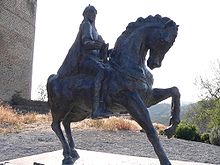Abu al-Qasim ibn Qasi


Abūʾl-Qāsim Aḥmad ibn al-Ḥusayn ibn Qasī (died 1151) was a
He was of native Iberian stock, rūmī al-aṣl in the words of Ibn al-Abbār. He was born at
Far from the political quietism, asceticism, and mysticism of Ibn Masarra, Ibn Barrajān, and Ibn ʿArīf, was the strong esotericist revolutionary insurgent Ibn al-Qaṣī. His murīdūn revolt was able to capture, and create a city state (ṭāʾifa) in Silves. Even before his political uprising, he was known by the state-jurist establishment for sowering corruption, possessing the minds of the ignorant, claiming sainthood, the titles of Imām, and Mahdī all in effort against the state. Ibn al-Qaṣī would later join the Almohads in conquering Andalus, only to later rebel against them with the help of the Christian King of Portugal, Alfonso Henrique, which caused his own followers to behead Ibn al-Qaṣī (d. 1151), shoving his head on the very lance given to him by Henrique. Ibn al-Qaṣī is most known for his treatise Discarding the Two Shoes and Borrowing Light from the Site of the Two Feet (Khalʿ al-naʿlayn wa iʾtibās al-nūr min mawḍiʿ al-qadamayn), which is influenced by Masarrian thought, amongst other undercurrents in Andalusia. Shaykh al-Akbar became familiar with this text, when he met Ibn al-Qaṣīʾs son in Tunis 1194. Ibn ʿArabī would later write a commentary (sharḥ) on the text pejoratively referring to Ibn al-Qaṣī as a blind follower (muqallid), an ignoramus (jāhil), an impostor, and nothing more than a transmitter of texts (nāqil); Ibn ʿArabī then goes on to elaborate on how Ibn al-Qaṣī was just parroting one of his teachers, Khalaf-Allāh, and that Ibn al-Qaṣī was not a muḥaqqiq, but rather an ignoramus. Although, Ibn ʿArabī did recognize him as a person of unveiling (kashf).
— Hamza A. Dudgeon, "The Counter-Current Movements of Andalusia and Ibn ʿArabī: Should Ibn ʿArabī be considered a Ẓāhirī", The Journal of the Muhyiddin Ibn Arabi Society Vol.64 (2018): 89-108.
See also
- Muridun
- Ibn Arabi
- Ibn Masarra
- Ibn Barrajan
- Ibn al-Arif
Notes
- ^ a b Goodrich, 16–27.
- ^ William Elliot: The Career of In Qasi as Religious Teacher and Political Revolutionary in 12th Century Islamic Spain, University of Edinburgh, 1979 p.39
References
- Viguera, María Jesús; Los reinos de Taifas. 2007. RBA Coleccionables. ISBN 84-473-4815-6
- J. Dreher, ed. and tr., Ibn Qasi, Abu l-Qasim Ahmad b. al-Husayn: Kitab Khal al-Na'Layn wa-Iqtibas al-Anwar min Mawdi al-Qadamayn (Das Imamat des islamischen Mystikers, Abulqasim Ahmad Ibn al-Husain Ibn Qasi: Eine Sudie zum Selbstverständnis des Autors des Buch vom Ausziehen der beiden Sandalen) Bonn, 1985
- J. Dreher, "L'Imamat d'Ibn Qasi à Mertola (Automne 1144-été 1145); Légitimité d'Une Domination Soufie?", MIDEO 18 (1988), pp. 195–210
- D. R. Goodrich, dissertation, A Sufi Revolt in Portugal: Ibn Qasi and his Kitab khal'al-na'layn, Columbia University, PH D. 1978
- Nagendra Kr Singh, International encyclopaedia of Islamic dynasties, p. 34 [1] (retrieved 1-12-2010)
- William Elliot, The Career of In Qasi as Religious Teacher and Political Revolutionary in 12th Century Islamic Spain, thesis submitted to University of Edinburgh, 1979.
